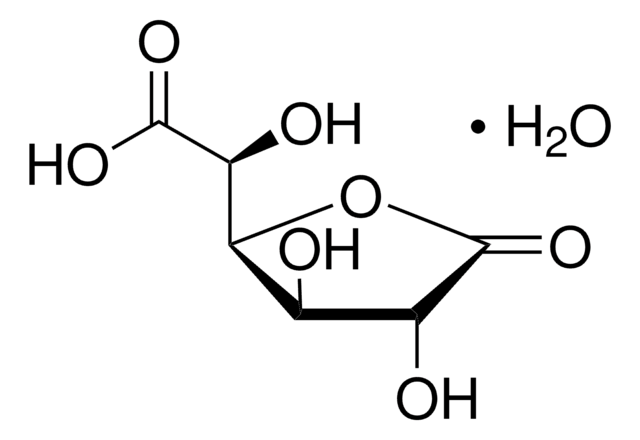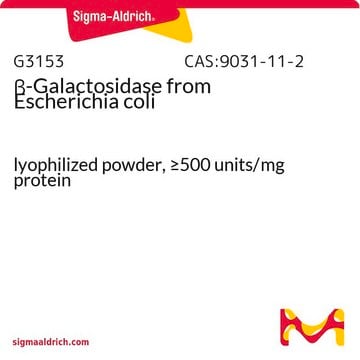I6034
α-L-Iduronidase human
recombinant, expressed in mouse NSO cells
Synonyme(s) :
IDUA
Se connecterpour consulter vos tarifs contractuels et ceux de votre entreprise/organisme
About This Item
Produits recommandés
Produit recombinant
expressed in mouse NSO cells
Niveau de qualité
Forme
solution
Activité spécifique
≥7,500 units/μg protein
Poids mol.
83 kDa
Impuretés
≤1.0 EU/μg Endotoxin
Conditions d'expédition
wet ice
Température de stockage
−20°C
Description générale
α-L-Iduronidase (IDUA) is mapped to human chromosome 4p16.3. The mature IDUA protein is glycosylated and comprises triosephosphate isomerase (TIM) barrel domain, β-sandwich, helix-loop-helix region and an immunoglobin-like domain. α-L-Iduronidase is classified under glycoside hydrolase (GH) family 39.
Application
α-L-Iduronidase may be used for leukocyte assay in the study of a-L-Iduronidase deficiency in new born.
Actions biochimiques/physiologiques
In lysosomal degradation process α-L-Iduronidase plays a crucial role. It hydrolyzes the non-reducing terminal α-L-iduronic acid residues in glycosaminoglycans (GAGs), including dermatan sulfate and heparan sulfate.
Mutation in the α-L-Iduronidase is implicated in Mucopolysaccharidosis I (MPS I) . This enzyme defect leades to accumulation of dermatan and heparan sulfate . MPS I pathophysiology is accompanied with deformation of the skull, mental retardation and hernias.
Catalyzes the hydrolysis of unsulfated α-L-iduronosidic linkages in dermatan sulfate
Propriétés physiques
Expressed as C-terminal histine-tagged protein (residues 1-653) with a caluclated molecular mass of 71 kDa migrating at ~83 kDa under SDS-PAGE reducing conditions.
Définition de l'unité
One unit will produce 1 picomole of 4-methylumbelliferone from 4-methylumbelliferyl-α-L-iduronide per minute at pH 3.5 at 25 °C.
Forme physique
Supplied as a solution in 40 mM sodium acetate , 400 mM NaCl and 20% (v/v) glycerol, pH 5.0
Code de la classe de stockage
10 - Combustible liquids
Classe de danger pour l'eau (WGK)
WGK 1
Point d'éclair (°F)
Not applicable
Point d'éclair (°C)
Not applicable
Certificats d'analyse (COA)
Recherchez un Certificats d'analyse (COA) en saisissant le numéro de lot du produit. Les numéros de lot figurent sur l'étiquette du produit après les mots "Lot" ou "Batch".
Déjà en possession de ce produit ?
Retrouvez la documentation relative aux produits que vous avez récemment achetés dans la Bibliothèque de documents.
Les clients ont également consulté
Mei Dai et al.
Proceedings of the National Academy of Sciences of the United States of America, 111(7), 2680-2685 (2014-02-20)
Use of megakaryocytes/platelets for transgene expression may take advantage of their rapid turnover and protective storage in platelets and reduce the risk of activating oncogenes in hematopoietic stem and progenitor cells (HSCs). Here, we show that human megakaryocytic cells could
Kristin D'Aco et al.
European journal of pediatrics, 171(6), 911-919 (2012-01-12)
Our objective was to assess how the diagnosis and treatment of mucopolysaccharidosis I (MPS I) have changed over time. We used data from 891 patients in the MPS I Registry, an international observational database, to analyze ages at symptom onset
Akemi Tanaka et al.
Molecular genetics and metabolism, 107(3), 513-520 (2012-10-02)
Hematopoietic stem cell transplantation (HSCT) has not been indicated for patients with mucopolysaccharidosis II (MPS II, Hunter syndrome), while it is indicated for mucopolysaccharidosis I (MPS I) patients <2 years of age and an intelligence quotient (IQ) of ≥ 70.
Diagnosis of alpha-L-iduronidase deficiency in dried blood spots on filter paper: the possibility of newborn diagnosis.
N A Chamoles et al.
Clinical chemistry, 47(4), 780-781 (2001-03-29)
Vassili Valayannopoulos et al.
Rheumatology (Oxford, England), 50 Suppl 5, v49-v59 (2012-01-11)
Better understanding of disease pathophysiology, improved supportive care and availability of disease-specific treatments for some of the mucopolysaccharidosis (MPS) disorders have greatly improved the outlook for patients with MPS disorders. Optimal management of these multisystemic disorders involves a multidisciplinary team
Notre équipe de scientifiques dispose d'une expérience dans tous les secteurs de la recherche, notamment en sciences de la vie, science des matériaux, synthèse chimique, chromatographie, analyse et dans de nombreux autres domaines..
Contacter notre Service technique











